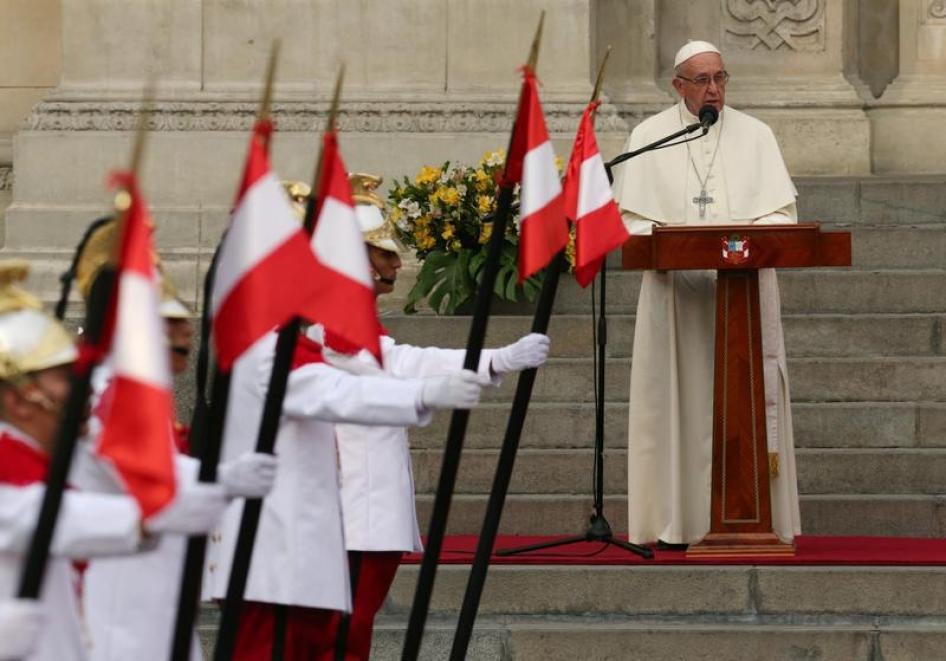On Sunday, Pope Francis ended an eagerly anticipated visit to Chile and Peru, his sixth trip to Latin America as pope. The visit was an opportunity for him to set the record straight regarding several human rights concerns. For many, it ended in serious disappointment.
Pope Francis could have clarified his views on the abusive rule of Venezuelan President Nicolás Maduro, which has sunk that country into the deepest human rights crisis in Venezuela’s recent history. Yet during his week in Latin America, the pope didn’t say a word in public about the crisis.
It wasn’t because he lacked the opportunity. The day Pope Francis arrived in Chile, Maduro threatened to prosecute two Venezuelan bishops for opinions they expressed during Mass, applying a law adopted by the pro-government Constituent Assembly that imposes prison sentences of up to 20 years on those who “encourage, promote, or incite hatred.” The pope reportedly called the bishops privately to express support, but he didn’t publicly condemn the attack on freedom of speech and religion.
On the same day that Maduro threatened the bishops, Venezuelan security forces and armed pro-government groups killed Oscar Pérez, a rogue police officer who had called on the Venezuelan people to rebel against the government, and six others, in Caracas. The government said they were “terrorists” who had been killed in a “confrontation.” But the available evidence—including videos posted by Pérez saying he would surrender, and a copy of the death certificate of several victims stating they were shot in the—strongly suggests they may have been extra-judicially executed.
The silence on Venezuela during this trip is consistent with the pope’s ambiguous approach to the situation there. He has expressed concern, often euphemistically, about the human rights crisis, but has not called out the government’s responsibility for systematic abuses. It’s almost as though he were describing a natural catastrophe. Shortly before his visit to Latin America, for example, he rightfully noted that Venezuela is suffering a “dramatic and unprecedented political and humanitarian crisis”—and he added that he hopes “conditions will be created” in which elections can resolve the country’s conflicts. The pope’s passive and abstract linguistic exertions convey something far less than real conviction.
In Chile, many were hoping Pope Francis would condemn the alleged sexual abuses against children for which, in several cases, bishops and other church authorities are under investigation. When he arrived in Santiago, the Pope asked for “forgiveness” on behalf of the church and expressed his “shame” about the abuses. Yet, two days later, he defended a bishop accused of covering up pedophilia, implying that victims lacked convincing evidence against him and saying that reports of the cover-up were “all slander.” On his plane back to Rome, the Pope “apologized” for asking victims for proof, but reiterated his view that they had engaged in slander.
That kind of talk from the pope could dissuade other victims from speaking up—and it wounds the dignity of those who, facing pain and stigma, have reported abuses. Sean O’Malley, a Cardinal from Boston who leads the Catholic Church commission charged with ending child abuse by religious authorities, criticized the Pope’s meddling in the case. Such words “abandon those who have suffered reprehensible criminal violations of their human dignity,” O’Malley said, “and relegate survivors to discredited exile.”
Peruvians, meanwhile, were expecting the pope to speak up on the release of the former autocratic President Alberto Fuijomori, who was recently granted a “humanitarian pardon.” Fujimori was serving a 25-year sentence for his role in extrajudicial killings, abductions, and enforced disappearances. There is strong reason to believe that his pardon was part of a negotiation to allow the current president, Pedro Pablo Kuczynski, to avoid impeachment. Fujimori’s release sparked an outcry from relatives of the victims and thousands of Peruvians. In a public letter to the pope, relatives of victims wrote that President Kuczynski had “snatched away the little justice we achieved with hard work, dedication, and pain.” Pope Francis did not take their side.
When Pope Francis was announced as the new head of the church in 2013, many believed that Latin America would benefit from an outspoken leader who seemed to promote a more caring and just world. On his visit last week, he continued to draw attention to such issues as poverty and the rights of prisoners and indigenous peolpe. Yet the Pope has too often given off signals that he is far less committed to the protection of political and civil rights—and this visit to Latin America was no different.









